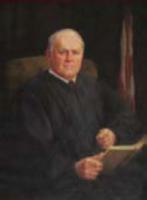Biographical Information

George Hughes Revercomb was born in Charleston, West Virginia on June 3, 1929. Immediately after graduating from Princeton University with a B.A. in 1950, he started law school at the University of Virginia but left in 1951 to serve for two years as a lieutenant in the Air Force in Korea. Afterwards he returned to the University where he was member of the editorial board of the Virginia Law Review.
From the time of his law school graduation in 1955 until 1961, Revercomb practiced law in Roanoke at Hazlegrove, Shackelford & Carr, in Charleston, West Virginia at Revercomb & Price, and in Norfolk at Vanderventer, Black, Meredith and Martin. However, his law practice was interrupted by two years' work in Washington: from 1957 to 1958 in the law department of Southern Railroad, and from 1958 to 1959 at the Federal Communications Commission. By 1962 he was back in Washington practicing law, first by himself and afterwards as a partner at Reeves, Harrison, Sams and Revercomb. In 1960 he had married McCall Henderson, of Washington; they eventually made their home in McLean, Virginia.
In 1969 he joined the Justice Department as an associate deputy attorney general but left a year later when President Nixon appointed him to the newly formed Superior Court of the District of Columbia. In 1985 President Reagan appointed him to the U.S. District Court for the District of Columbia, the seat he held until his death from cancer in 1993.
Judge Revercomb was a visiting lecturer at the University of Virginia Law School for many years and was a member of the law school's first class (1982) of judges to receive the LL.M in the Judicial Process. Before he went on the bench he was active in the Republican party and participated in numerous state and national bar association activities. And in 1970 he was vice-chairman of the U.S. Delegation to the United Nations Conference on Prevention of Crime and Treatment of Offenders in Kyoto, Japan. He was a fellow of the American Bar Foundation and took an active role in the Judicial Counsel for the D. C. Circuit and the U. S. Judicial Conference.
Chief Justice William Rehnquist spoke at the dedication of the Revercomb portrait at the D.C. District Courthouse in May of 1994. He recalled his long friendship with the judge and the many evenings he and his wife spent playing bridge with McCall and George Revercomb. Of Revercomb's service on the court Rehnquist said:
For him, judging was a calling, just as the ministry is a calling for some. He had always wanted to be a judge. From the time he ascended the bench, as we judges like to put it, until his death last summer, he upheld the very best traditions of the Judiciary.
What could better illustrate this than his determination, in his final days in the hospital, to complete his decision in the complicated dispute arising out of the construction of the Green Line of the Metro system Mergentime Corporation v. Washington Metropolitan Area Transportation Authority, signed on July 30, two days before he died].
On the occasion of the dedication two former law clerks spoke of their great admiration and affection for the judge. In Theodore C. Whitehouse's words:
Each of us obtained from our service with Judge Revercomb an education about law, service, unwavering adherence to principle,and above all, a respect for the dignity of every person. We also gained an invaluable friend and mentor who was always there to advise and help whenever he could. . . .
He never lost his intense concern for each litigant who appeared before him because to him, cases were about people, and he wanted to be very sure that the people affected by his decisions were treated fairly and justly. This was especially true where criminal sentencing was concerned. . . .
Judge Revercomb fulfilled his life-long ambition to be a judge, and carried out that office with honor and distinction to the very end. (860 F. Supp. LXVII -LXXIV)
